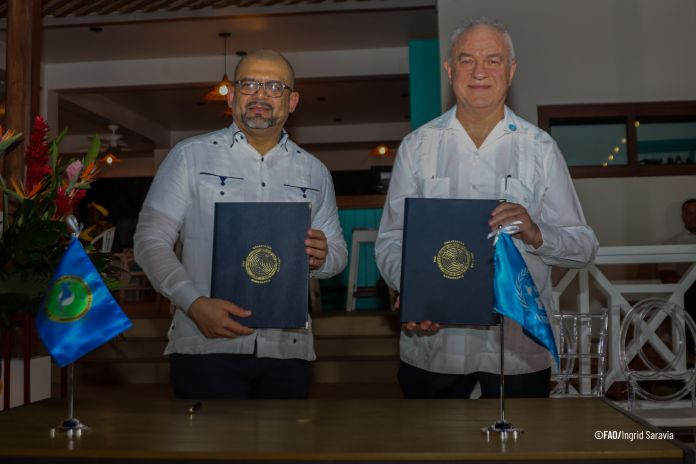– The initiative aims to expand investments and enhance solutions to support the countries of this sub-region in the transformation of agriculture to adapt to climate change and improve food security.
PLACENCUA, Belize – The Food and Agriculture Organization of the United Nations (FAO) and the Central American Integration System (SICA) signed an unprecedented Framework Cooperation Agreement whose main objective is to jointly support the transformation of agrifood systems in the countries of the dry corridor.
This agreement enhances collaboration and joint efforts between FAO and SICA to promote economic, social, environmental, and cultural determinants of food and nutritional security in SICA member countries. It also seeks to facilitate the exchange of knowledge and experience on issues such as resilient agriculture, climate change, and sustainable management of natural resources (including water, land, forests, and biodiversity).
FAO assistant director-general and regional representative for Latin America and the Caribbean, Mario Lubetkin, spoke at the LVII ordinary meeting of heads of state and government of the Central American Integration System, held in Placencia, Belize.
During his speech, Lubetkin stressed the importance of organizations such as FAO being able to work in coordination with member states and thus work together to address the impact that hunger, malnutrition, and poverty have caused in nations.
In addition, the FAO assistant director-general stressed that “food security and nutrition have been consolidated as central axes in the development agendas of all regions of the world with notable actions that demand us to promote greater joint cooperation, through an open and permanent dialogue.”
In this line, Lubetkin highlighted the agreement reached between FAO and SICA, ensuring that “this agreement adds cooperation efforts to expand investments and sustainable solutions in the large territory of the Dry Corridor, supporting countries in the transformation of agriculture, to make it more resilient and adapted to climate change and in turn, generating food and more employment opportunities and income, based on sustainable production systems.”
FAO and various SICA bodies work in a coordinated manner to ensure an agricultural sector that not only meets food production needs but also contributes to restoring ecosystem integrity. Together, they develop policies prioritizing forest integrity and implementing solutions for climate change adaptation and mitigation, thus promoting sustainable economic development while ensuring the conservation of carbon stocks and biodiversity. These joint efforts are vital steps to reduce climate vulnerability in the SICA region.
The FAO-SICA agreement serves as a model for regional cooperation and demonstrates the collective strength and commitment of the participating organizations to address the complex challenges facing the agricultural sector and the environment in the SICA region.
Post crisis scenario
Latin America and the Caribbean have been impacted by a series of successive crises that have led to an increase in hunger and malnutrition in all its forms. Income inequality in the region, climate change, and a generalized economic crisis have been major factors in this situation.
Food insecurity in the region increased by nearly 100 million people, and the number of hungry people rose from 43.3 million to 56.5 million between 2019 and 2021.
In SICA member countries, a growth from 7.2 to 7.5 million people was evidenced, values recorded 20 years ago, also an impact caused by the COVID-19 pandemic.
Photos here.





